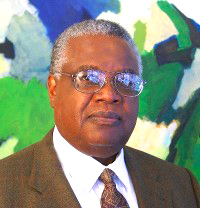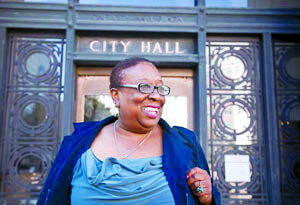Army Base Project Hired Only Eight Workers from West Oakland
Aug 23, 2014
Posted in Army Base Jobs, Community, Economic Development, Environment, Equal Rights/Equity, Gentrification

By Ken A. Epstein
More and more people in the community are raising concerns that the $1.2 billion Army Base project is not living up to its promises to deliver jobs to local residents who are trying to break into the construction trades.
In particular, the project hired only eight workers who live in West Oakland out of 171 total new hires between October 2013 and Aug. 1, 2014.
During negotiations several years ago it was agreed upon by all parties at the table that community benefits would prioritize jobs for West Oakland residents, who have been adversely affected for many years by the Army Base and the Port of Oakland.

Because of legal restrictions, the city can only require hiring by zip code and residence but not by race. However, activists have wanted to see increased percentages of African American workers, who have long been underrepresented in many construction unions.
At the Army Base, though African Americans represent 27.3 of the city’s population, they have received only 14.9 percent of the total work, which means they are 45 percent underrepresented in comparison with their percentage in the population.
Focus is now being turned to the benefits agreement, which was negotiated with community groups at the table and passed by the City Council requiring that 50 percent of the jobs go to local residents and allegedly providing stronger guarantees than ever before that these promises would be delivered upon.
But along the way, say activists, the verbal agreements were subverted. As written, the agreement does not match up with what everyone had thought they had agreed upon during negotiations.
“We believe that the African American community has not received a fair portion of the jobs available at the Oakland Army Base – the process, whatever it is, is not working,” said attorney Gorge Holland, president of the Oakland chapter of the NAACP and member of the Oakland African American Chamber of Commerce.
“We were led to believe that a large number of jobs were supposed to go to West Oakland,” Holland said. “There should be better oversight to make sure those who are affected by lack of employment would be considered more favorably.”
The West Oakland Job Resource Center was supposed b a “clearing house” for Army Base jobs, a place where all the jobs would be listed, so that the proof of what was happening at the base would be transparent to all.

But somewhere along the line, the job center turned out to be something different. Though the center has found work for a number of people, only 11 people have been employed at the Army Base through June.
When the job benefits were originally negotiated, there were a number of community groups at the table along with city representatives and master developer Phil Tagami of CCIG.
Questions about what happened to the promises and what can be done to repair and enforce the agreement were directed to the community groups who sat at the table and negotiated the agreements. Besides OaklandWorks, which is speaking out, there were a number organizations claiming to represent community interests: East Bay Alliance for a Sustainable Economy (EBASE), Alliance of Californians for Community Empowerment (ACCE), Alameda Labor Council and the Building and Construction Trades Council of Alameda County.
Post spoke with leaders of OaklandWorks but by deadline was unable to interview Andreas Culver, secretary treasurer of the building trades council.
Despite repeated calls, the Post did not receive replies from EBASE, ACCE, or Josie Camacho, executive secretary treasurer of the Alameda Labor Council.
“There are so many loopholes now that it comes down to a voluntary, ‘good faith’ agreement,” said Margaret Gordon of OaklandWorks, who was at the negotiating table.
People negotiated one thing, but then the agreement went to labor and other “stakeholders,” and it was changed before it went to the city council, said Gordon.
At this point, the discussion must go back to the City Council, which has to deal with Phil Tagami, has final say-so over changes in the written agreement, she said.